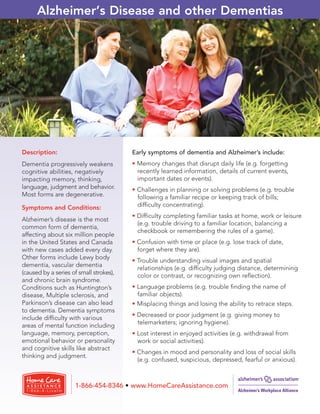
Alzheimers Disease and other Dementias flyer_2015
- 1. 1-866-454-8346 • www.HomeCareAssistance.com Alzheimer’s Disease and other Dementias Description: Dementia progressively weakens cognitive abilities, negatively impacting memory, thinking, language, judgment and behavior. Most forms are degenerative. Symptoms and Conditions: Alzheimer’s disease is the most common form of dementia, affecting about six million people in the United States and Canada with new cases added every day. Other forms include Lewy body dementia, vascular dementia (caused by a series of small strokes), and chronic brain syndrome. Conditions such as Huntington’s disease, Multiple sclerosis, and Parkinson’s disease can also lead to dementia. Dementia symptoms include difficulty with various areas of mental function including language, memory, perception, emotional behavior or personality and cognitive skills like abstract thinking and judgment. Early symptoms of dementia and Alzheimer’s include: • Memory changes that disrupt daily life (e.g. forgetting recently learned information, details of current events, important dates or events). • Challenges in planning or solving problems (e.g. trouble following a familiar recipe or keeping track of bills; difficulty concentrating). • Difficulty completing familiar tasks at home, work or leisure (e.g. trouble driving to a familiar location, balancing a checkbook or remembering the rules of a game). • Confusion with time or place (e.g. lose track of date, forget where they are). • Trouble understanding visual images and spatial relationships (e.g. difficulty judging distance, determining color or contrast, or recognizing own reflection). • Language problems (e.g. trouble finding the name of familiar objects). • Misplacing things and losing the ability to retrace steps. • Decreased or poor judgment (e.g. giving money to telemarketers; ignoring hygiene). • Lost interest in enjoyed activities (e.g. withdrawal from work or social activities). • Changes in mood and personality and loss of social skills (e.g. confused, suspicious, depressed, fearful or anxious).
- 2. As the disease progresses, individuals will require around-the-clock safety monitoring and support with lifestyle and household activities. More severe symptoms include: • Change in sleep patterns, often waking up at night. • Difficulty completing basic tasks and IADL’s (e.g. preparing meals, choosing proper clothing, taking care of hygiene, eating). • Forgetting personal history (e.g. losing awareness of self, not recognizing family). • More severe language problems (e.g. not pronouncing words correctly, speaking in confusing sentences, difficulty understanding language). • Hallucinations and delusions. • Severe changes in mood and personality (e.g. more argumentative, violent behavior). Caregiver Tips: • Be patient. Always address the person by his/her name to get his/her attention, speak slowly and clearly, use simple words, and maintain eye contact while speaking. Allow time for the person to process and respond. • Be consistent. Individuals respond best to a stable and established routine. Engage client in mentally stimulating exercises and encourage socialization as able and desired. • Limit stimulation. Try to approach the person from the front—approaching from behind or touching your client unexpectedly can startle him/her. Avoid sudden movements, loud noises and activities that rely on short-term memory. Limit choices to no more than 2 options and ask 1 question at a time. • Keep track of important items. Look for missing items together. Consider keeping duplicates of important items or those the person tends to hide. For example have 2 or 3 purses or wallets with small amounts of money or pictures of family/friends. • Reassure. If you take your client out (for example to the doctor’s office) explain where you are, why you are there and when you will be going home. • Be compassionate. A gentle touch, word of praise, or calm tone can put your client at ease. Treat your client with love and respect. • Maintain composure. Never argue or confront the person and avoid using the word “no” even if that means agreeing to unrealistic demands—you can distract later. If delusions or hallucinations occur, react calmly, listen and give a non-committal answer (e.g. “I don’t hear the voices that you hear but it must be frightening to you.”) • Avoid upsetting triggers. Remove client from an upsetting situation or the upsetting stimulus and identify patterns to avoid triggers in the future. • Reduce aggression. Remove yourself from the room if your client becomes physically aggressive and wait until he/she calms down. If you are very concerned, remove heavy or sharp objects from the area as well. • Promote Calm. Give the person objects that have a calming effect such as a stuffed animal, fuzzy blanket, or a cup of tea. Soft music also helps. • Distract. If your client becomes agitated or suspicious, distract him/her. Give him/her a chore to do like folding towels, counting cards, or raking leaves or distract with an enjoyable activity such as looking at family photos or telling stories. • Supervise. Prevent wandering. Food refusal is common so encourage eating. When assisting with showering, use a handheld shower head and start from the feet first, always explaining what you are doing.